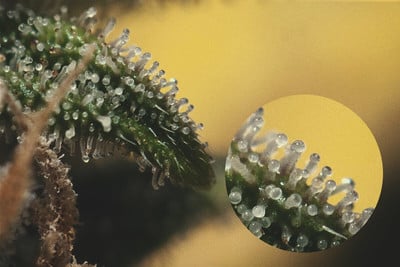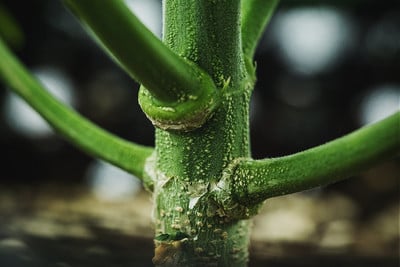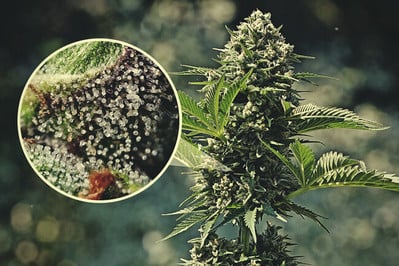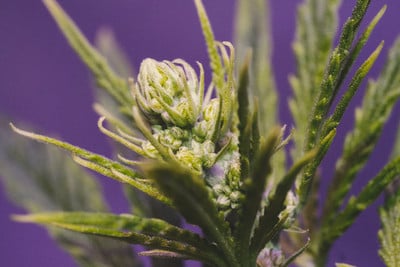 Weed Grow Guide by Royal Queen Seeds
Weed Grow Guide by Royal Queen Seeds
- Growing weed step by step
- Cannabis growing basics
- Choosing your seeds
- How to germinate seeds
- The cannabis vegetative stage
- The cannabis flowering stage
- Harvesting cannabis
- Trimming, drying, and curing
- Choosing pots and soil
-
Growing indoors
- A Complete Overview Of Growing Cannabis Indoors
- Cannabis Cultivation Tips: How To Set Up Indoor Grow Lights
- How Many Cannabis Plants Can You Grow Per Square Metre?
- Indoor Cannabis Growing: Relative Humidity and Temperatures
- Hydroponics Cannabis Growing Guide (with diagrams)
- Cannabis Micro Growing: Growing Great Weed in Tiny Spaces
- Growing outdoors
- How to grow autoflowering cannabis
- Cannabis nutrients and pH
- Cannabis troubleshooting: Nutrients
-
Cannabis troubleshooting: Growing
- Cannabis Seed Germination — Troubleshooting Guide
- How to Deal With Pythium (Root Rot) in Cannabis Plants
- Slow Cannabis Plant Growth And What You Can Do About It
- How to Prevent and Fix Stretching in Cannabis Seedlings
- Watering Your Cannabis: How to Fix Overwatering and Underwatering
- Understanding Male, Female, And Hermaphrodite Cannabis
- Identifying and Treating Common Cannabis Ailments
- How To Revive a Sick Cannabis Plant
- How to Avoid Mouldy Weed During Drying and Curing
- How to Prevent and Treat Dry and Crispy Cannabis Leaves
- What Cannabis Leaves Can Tell You
- Causes and Solutions for Yellow Cannabis Leaves
-
Cannabis Strains Grow Report
- HulkBerry Automatic Grow Report
- Blue Cheese Auto Grow Report
- Purple Punch Automatic Grow Report
- Triple G Automatic Grow Report
- Do-Si-Dos Automatic Grow Report
- Green Gelato Automatic Grow Report
- Haze Berry Automatic Grow Report
- Purple Queen Automatic Grow Report
- Cookies Gelato Automatic Grow Report
- Sherbet Queen Automatic Grow Report
- Sweet Skunk Automatic Grow Report
- Medusa F1 Grow Report
- Cannabis plant training
-
Weed growing tips
- The Cannabis Plant Anatomy
- How to preserve seeds
- How Much Sunlight Do Outdoor Cannabis Plants Need To Grow?
- How to Control and Prevent Stretching in Cannabis Plants
- My Cannabis Plants Are Growing Too Tall: What Should I Do?
- Should You Worry About Purple Or Red Cannabis Stems?
- What To Do When Your Indoor Cannabis Won’t Flower
- How To Protect Your Cannabis Plants From Heat Stress
- How To Tell If Your Female Cannabis Plant Has Been Pollinated
- Growing Medical Marijuana
- Bud Washing: How to Clean Your Weed
- Understanding Cannabis Yield per Plant

How To Tell If Your Female Cannabis Plant Has Been Pollinated
Contents:
- How to tell that a female plant has been pollinated
- How to avoid pollination of your female plants
- How to spot male cannabis plants
- How did your indoor weed plants become pollinated?
- What to do when your females get pollinated?
- Can you smoke pollinated females?
- How to avoid the issue of pollination
- Can you grow the resulting seeds?
- Why you should avoid buying seedy weed
There is a good reason why most growers keep male plants away from their females: Pollination from males causes the females to develop seeds. As a result, females focus their energy on seed production, rather than on growing you some fine-quality bud. This seedy and unfortunate final product can be avoided by implementing a few basic techniques.
Obviously, no one wants to smoke seedy weed. When you grow cannabis and learn how to identify male plants and signs of pollination, you can remove these plants to save your remaining females. Likewise, recognising a pollinated female early allows you to start again before it’s too late, rather than finishing a grow that will only result in a poor-quality harvest.
Never underestimate just how far cannabis pollen can travel. This microscopic genetic material can spread within a radius of 3–7.5 miles (~4.8–12.1 kilometres). However, during rough weather, it can ride the wind over distances of 30 miles (48km). When growing outside, you have more to think about than males on your own property. Growers in the next town that aren’t paying attention to sexing could put your plants at risk if you don’t put additional measures in place.
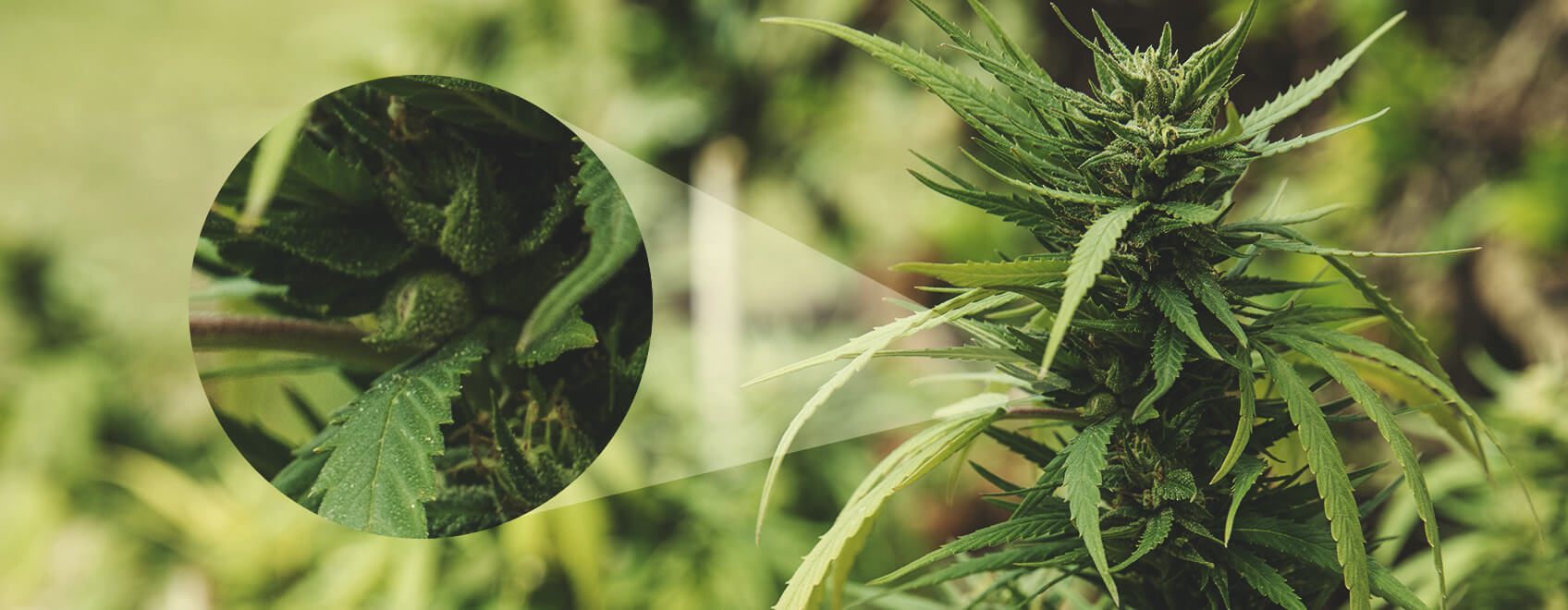
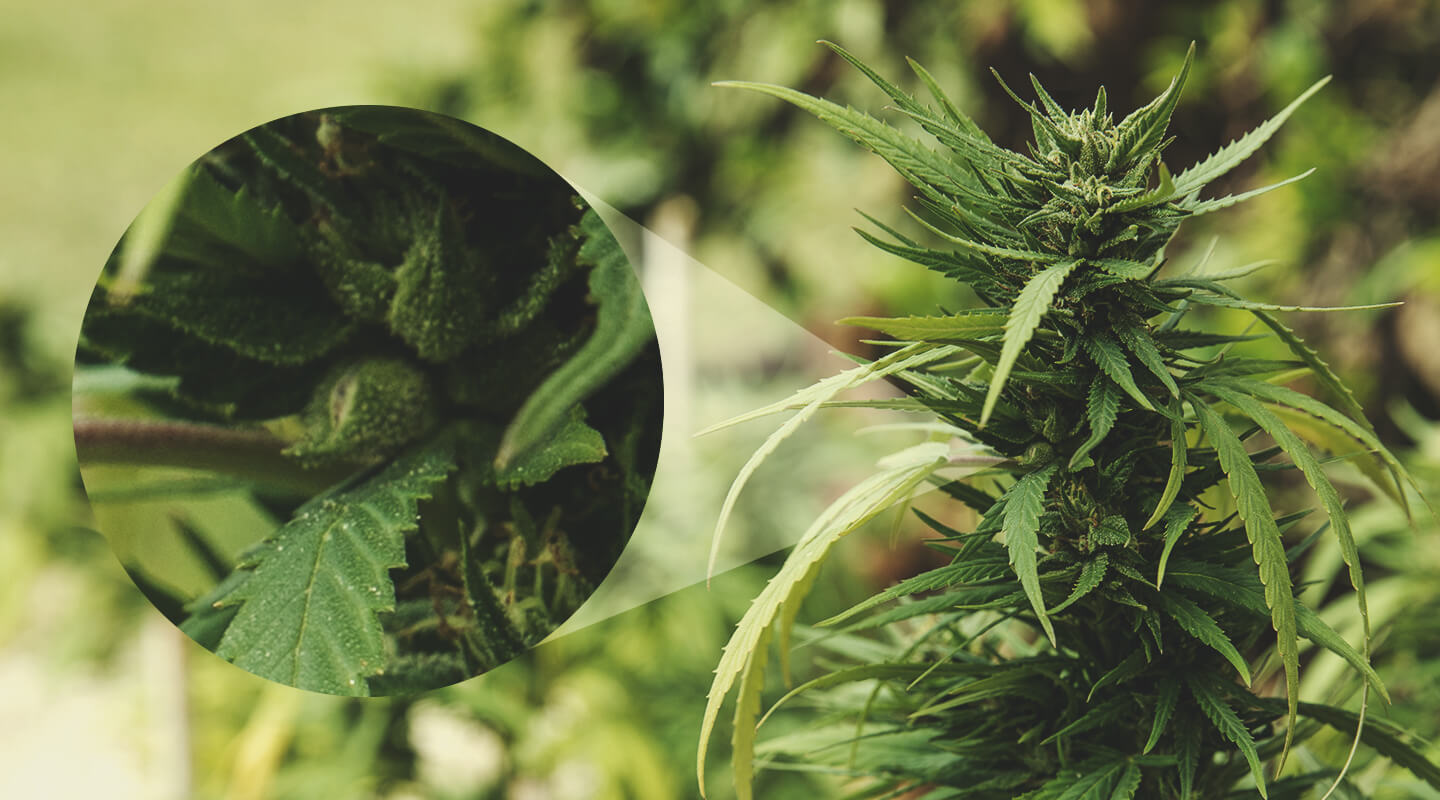
How To Tell That A Female Plant Has Been Pollinated
Among the early signs that your female has been pollinated is that her bracts become larger. Bracts are small, leaf-like structures that protect the female’s reproductive parts. These are the sites from which the flowering buds appear. Do not confuse the bracts with calyxes.
A good test to see whether the bracts have swollen is to take a pair of tweezers, grab one bract, and open it up. If there is a seed inside, you have a pollinated plant.
Another indication of pollination can be the colour of her pistil hairs. When a female has been pollinated, the previously white hairs will soon shrivel and become darker.
You can also tell if pollen has fertilised a female plant by paying close attention to the pistils—the flowers' reproductive organs. These hair-like structures change in colour over the course of the normal flowering phase from white to dark orange or red. In unfertilised flowers, the entire pistil will undergo this change. However, following exposure to pollen, only the tips of the pistils turn dark, whereas the “stalk” remains white.
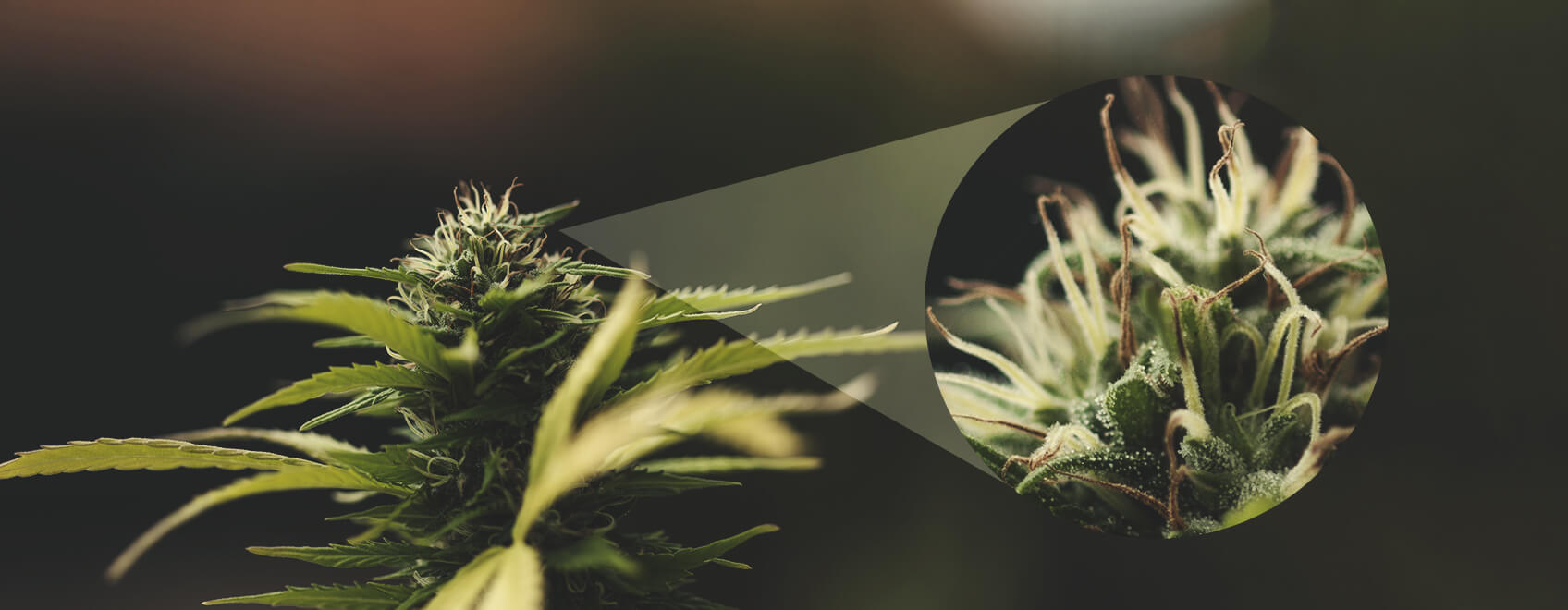
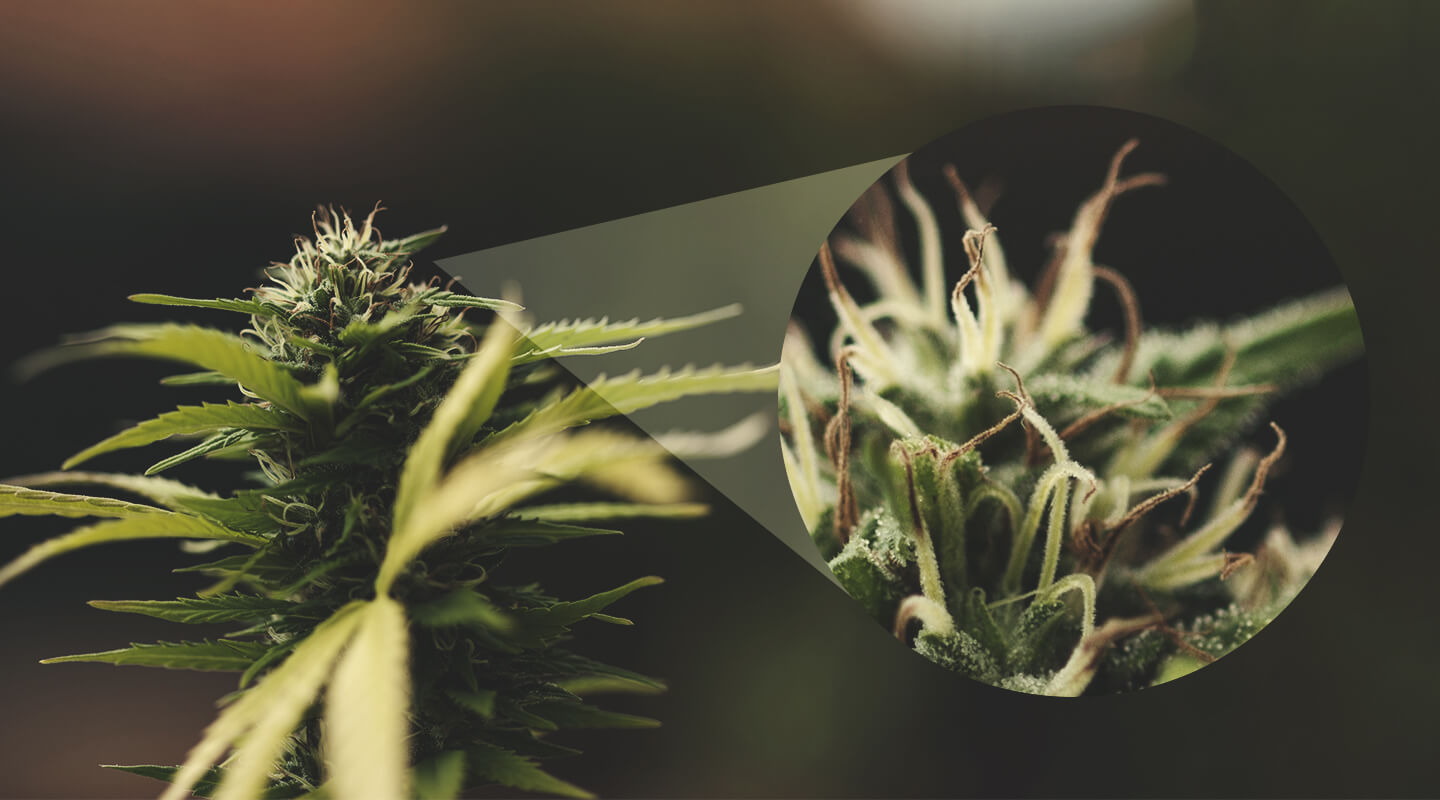
How To Avoid Pollination Of Your Female Plants
Pollination requires the presence of males or intersex (hermaphrodite) plants, which are females that will also produce pollen. The first thing you want to do to keep the risk of pollination low is to remove as many males or “hermies” as as you can. Especially during the first three weeks of flowering, it’s important to frequently check for possible male specimens in your garden.
The typical cannabis grower normally doesn’t have a reason to keep males, and will want to get rid of them as soon as they are spotted. Cannabis breeders, on the other hand, may want to keep males along with their crop of female plants. In such cases, the breeder will normally separate the sexes to avoid any accidental pollination. They may grow females in one tent and males in another. When grown outdoors, such as in a garden, the males are often kept in the most remote corner of their growing area, as far from the females as possible. Even then, because of the wind carrying around the pollen, there is always some risk of accidental pollination.
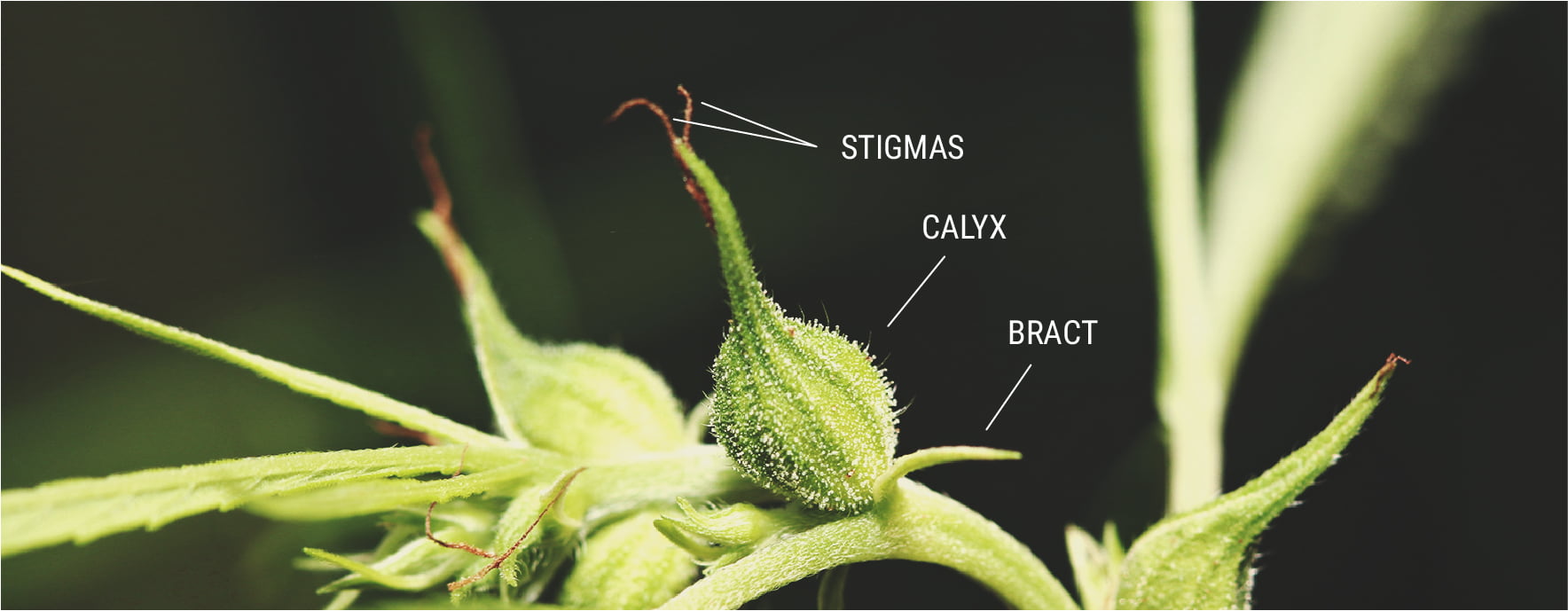
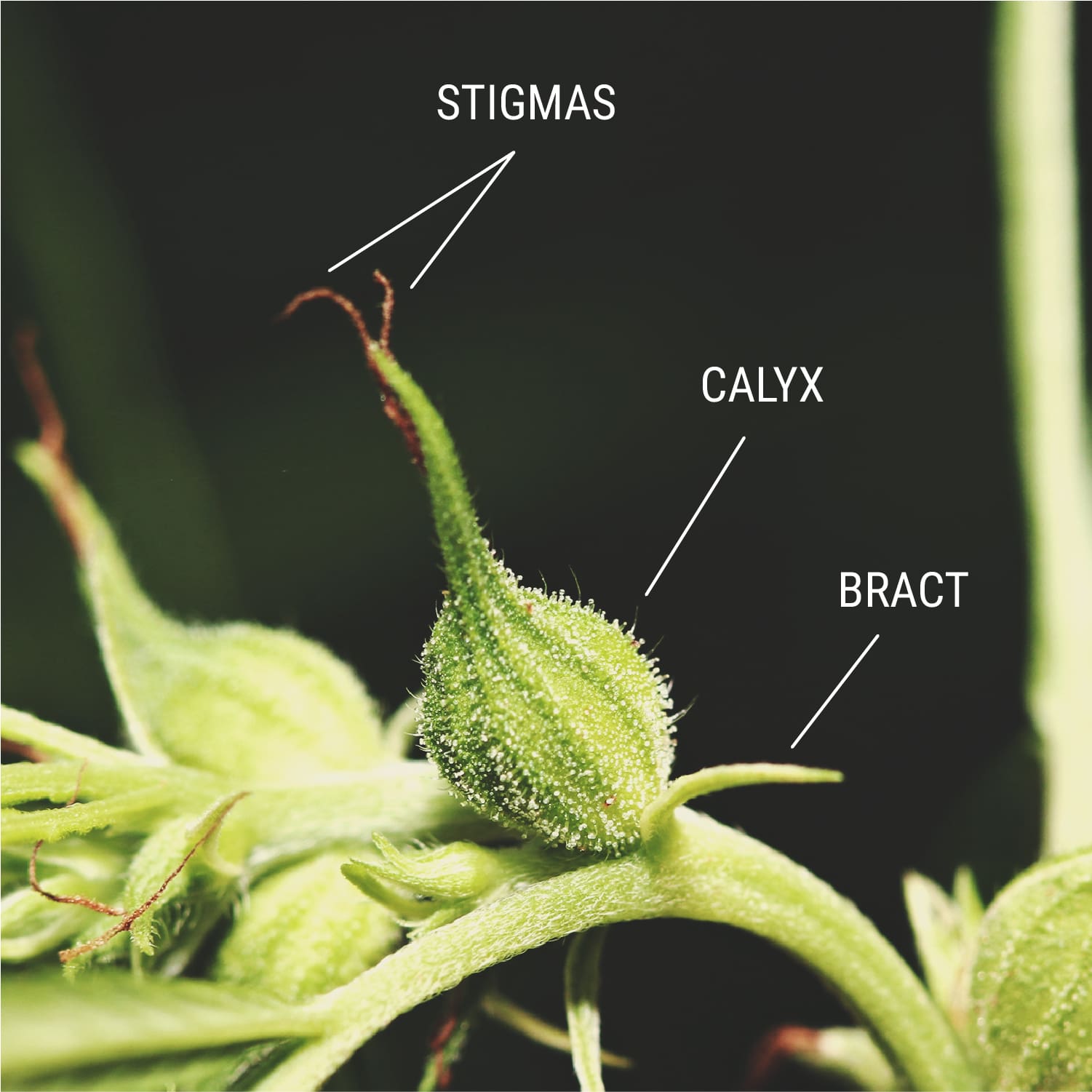
How To Spot Male Cannabis Plants
To determine the sex of your cannabis plants, you will have to wait until the pre-flowering stage when plants begin to put their energy into reproduction. Female cannabis plants show their gender signs later than males. At the location where they will soon grow their buds (the nodes between the stalk and the stem), females will show wispy white hairs.
Male plants won’t show hairs at these nodes, but will develop little sacs of pollen. These pollen sacs will look like little balls. These balls can appear on their own or in clusters, depending how far into the pre-flowering stage the plant is. At some later stage of growth, the pollen sacs will burst open, spilling the pollen and possibly pollinating your females.
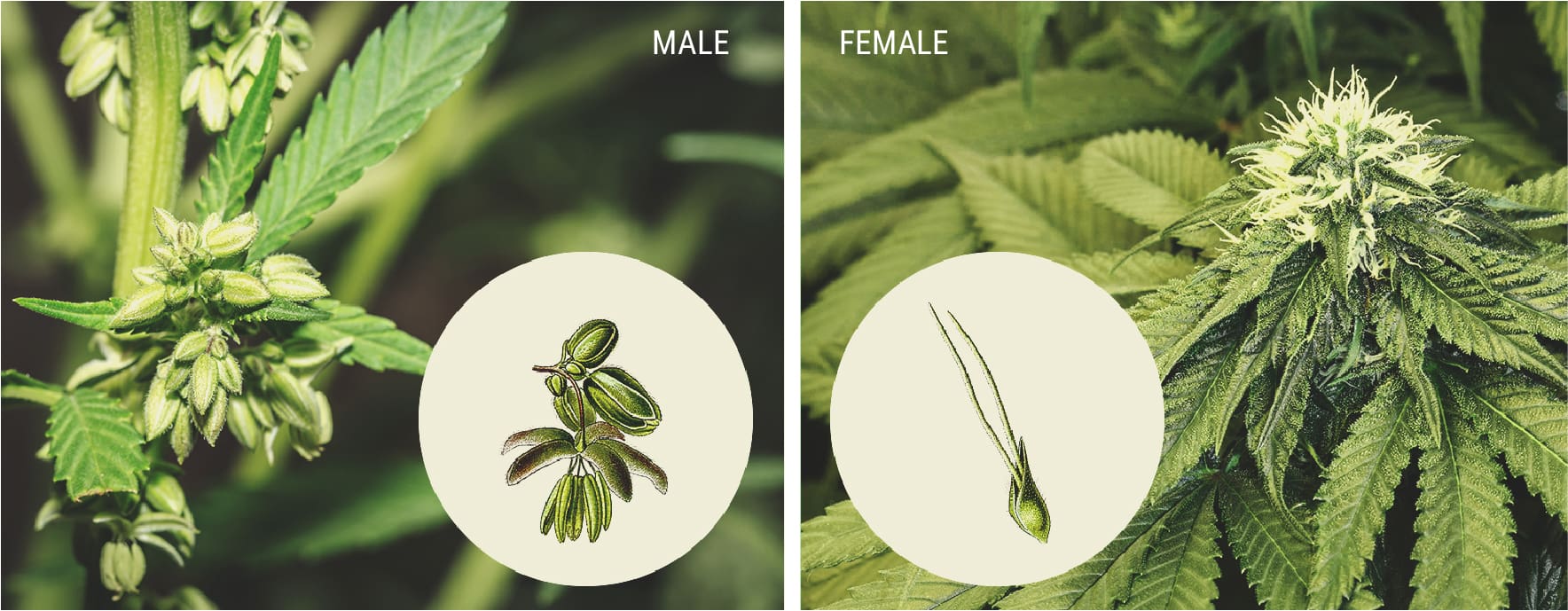
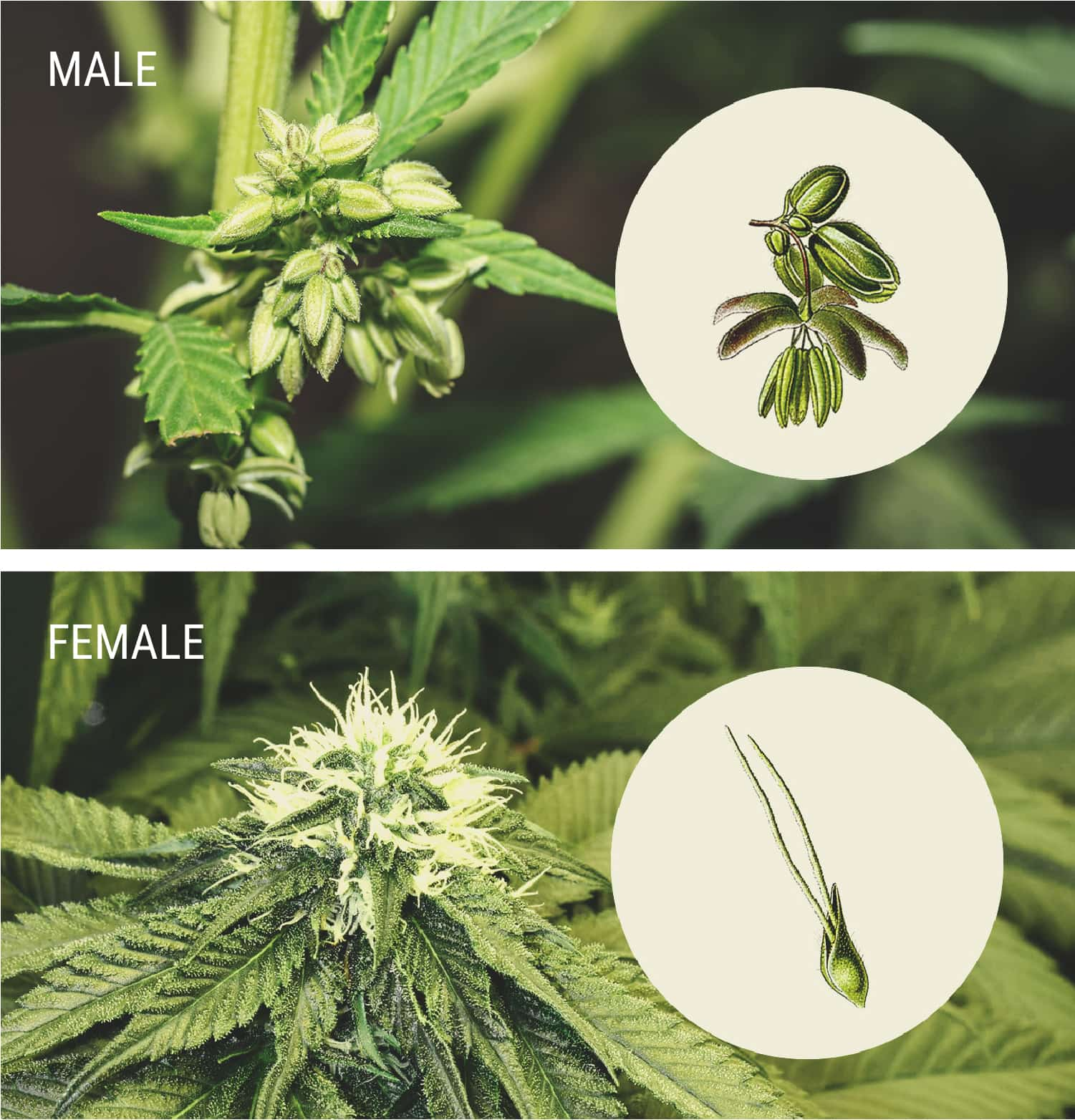
How Did Your Indoor Weed Plants Become Pollinated?
You grew cannabis in the isolation of an indoor grow tent. You played it safe, and routinely checked each of your plants for signs of pollen sacs. Yet, somehow, your female plants still became fertilised and started to produce seeds. How, how on Earth did this happen?
Well, there are multiple causes to consider. First, you may have served as a vector for pollen enter the growing space. These microscopic particles can easily cling to the fibres of clothes and nestle themselves into your hair. If you deal with male plants in a separate growing space, you may have brought pollen into your female-only grow tent.
Second, your plants might be stressed! Environmental factors that induce stress can force female plants to develop sex organs colloquially known as “bananas”. These are essentially pollen sacs on female plants. They form mostly as a result of stress from light leaks, which causes plants to go into survival mode and pollinate themselves.
These pollinating structures are hard to spot, and growers often miss them. Unlike mixed-sex plants, or "true" hermaphrodites, that display obvious female and male organs separately, bananas occur on female buds. Additionally, bananas aren't entire pollen sacs. They are only the inner portion, or anther. From a distance, growers could easily mistake the shape and colour for pistils. Because they lack the external sac, bananas immediately start spilling pollen onto the flower and cause rapid fertilisation.
What To Do When Your Females Get Pollinated?
Spotting male cannabis plants and pollinated females early can save you from investing further time and effort into an entire growing season that will be for naught. Most of the time, the best course of action is to get rid of the males along with your pollinated females and just start a new grow.
Can You Smoke Pollinated Females?
Absolutely! While you wouldn’t welcome the sight of seedy buds in a dispensary, you can indeed smoke fertilised flowers. Although a last resort, you certainly don’t have to discard your seedy bud. You’ll still get to enjoy some tasty terpenes and mind-altering cannabinoids; it just takes a bit more work.
After harvesting seedy buds, you’ll need to remove them from the flowers. You can do this by hand or with a pair of tweezers, making sure not to miss any. Alternatively, you can lightly grind your flowers, enough to shred away flower tissue but without breaking up any seeds. Then, remove the seeds as they become dislodged.
You can also slice up your flowers to remove the seeds. Use some trimming scissors to chop your buds into smaller pieces, removing the seeds as you go. You can smoke this material, or perhaps combine it with your trim and make some dry ice hash.
However, keep in mind that some people are sensitive to cannabis pollen, just like people react to the pollen of other species. If you experience pollen allergies, you might want to give smoking fertilised buds a miss.
Of course, you should always aim to protect your flowers from pollen in order to produce the finest sinsemilla possible. Seedy buds just don’t compare to unfertilised flowers. Check out the main reasons why it doesn’t rank as high below.
| Poor Taste | Fertilised flowers divert their attention away from pumping out sticky resin and toward seed production. This results in fewer tasty terpenes, which underpin the unique flavour and aroma of each cultivar. |
| Lower THC Levels | A reduction in resin also means lower amounts of cannabinoids such as THC. You’ll experience less potency from seedy buds than those that churn out resin all the way up until harvest time. |
| It Can Cause Discomfort | Seeds can ruin the smoking experience. For one, they make the smoke extremely harsh and can irritate the throat when combusted. Seeds also have a tendency to pop when exposed to heat, which can leave the end of your joint blown out. |
| Poor Taste | Fertilised flowers divert their attention away from pumping out sticky resin and toward seed production. This results in fewer tasty terpenes, which underpin the unique flavour and aroma of each cultivar. |
| Lower THC Levels | A reduction in resin also means lower amounts of cannabinoids such as THC. You’ll experience less potency from seedy buds than those that churn out resin all the way up until harvest time. |
| It Can Cause Discomfort | Seeds can ruin the smoking experience. For one, they make the smoke extremely harsh and can irritate the throat when combusted. Seeds also have a tendency to pop when exposed to heat, which can leave the end of your joint blown out. |
How To Avoid The Issue Of Pollination
There is, of course, a way to avoid the issue of pollination altogether for the home grower. As a result of innovation in the modern cannabis industry, feminised seeds are now available in a wide variety of new and legendary strains. Unlike with regular seeds, you won’t need to even worry about identifying or separating males during your grow. As long as your feminised seeds are sourced from a reputable retailer, all seeds will grow into plants with smokable bud. With this knowledge, it is up to you to decide what kind of seeds will suit your growing parameters and personal goals as a cultivator.
Can You Grow the Resulting Seeds?
Your flowers went to seed, so why not make the best out of the situation by germinating them and growing more plants? You can certainly do this, but it might not end well. Good cultivars are created through intentional breeding. This allows growers to lock in desirable traits and rule out bad characteristics. The resulting seeds from these operations are genetically stable and consistent.
If your plants become accidentally pollinated, however, growing the progeny will be a gamble. You’ll likely end up with an unreliable variety with poor productivity, inferior flavours, and undesirable effects. However, if you have the time and resources to spare, you can always give it a go. You might end up with something special!
However, you should avoid growing seeds from a plant that self-pollinated. Specimens that developed hermaphrodite traits will pass this on to the progeny, so you'll experience the same situation again.
Why You Should Avoid Buying Seedy Weed
As stated, you should avoid buying seedy weed because of the inferior taste and effects, as well as the harsh smoke. Bottom line—spending money on seedy buds means you’re getting ripped off. Just as you wouldn’t be too pleased to receive a bag filled with stalks, seeds also add to the total weight of the bag, meaning you're getting less cannabis for the price you’d normally pay.
 Grow Guide Topic Finder
Grow Guide Topic Finder
- Growing weed step by step
- Cannabis growing basics
- Choosing your seeds
- How to germinate seeds
- The cannabis vegetative stage
- The cannabis flowering stage
- Harvesting cannabis
- Trimming, drying, and curing
- Choosing pots and soil
-
Growing indoors
- A Complete Overview Of Growing Cannabis Indoors
- Cannabis Cultivation Tips: How To Set Up Indoor Grow Lights
- How Many Cannabis Plants Can You Grow Per Square Metre?
- Indoor Cannabis Growing: Relative Humidity and Temperatures
- Hydroponics Cannabis Growing Guide (with diagrams)
- Cannabis Micro Growing: Growing Great Weed in Tiny Spaces
- Growing outdoors
- How to grow autoflowering cannabis
- Cannabis nutrients and pH
- Cannabis troubleshooting: Nutrients
-
Cannabis troubleshooting: Growing
- Cannabis Seed Germination — Troubleshooting Guide
- How to Deal With Pythium (Root Rot) in Cannabis Plants
- Slow Cannabis Plant Growth And What You Can Do About It
- How to Prevent and Fix Stretching in Cannabis Seedlings
- Watering Your Cannabis: How to Fix Overwatering and Underwatering
- Understanding Male, Female, And Hermaphrodite Cannabis
- Identifying and Treating Common Cannabis Ailments
- How To Revive a Sick Cannabis Plant
- How to Avoid Mouldy Weed During Drying and Curing
- How to Prevent and Treat Dry and Crispy Cannabis Leaves
- What Cannabis Leaves Can Tell You
- Causes and Solutions for Yellow Cannabis Leaves
-
Cannabis Strains Grow Report
- HulkBerry Automatic Grow Report
- Blue Cheese Auto Grow Report
- Purple Punch Automatic Grow Report
- Triple G Automatic Grow Report
- Do-Si-Dos Automatic Grow Report
- Green Gelato Automatic Grow Report
- Haze Berry Automatic Grow Report
- Purple Queen Automatic Grow Report
- Cookies Gelato Automatic Grow Report
- Sherbet Queen Automatic Grow Report
- Sweet Skunk Automatic Grow Report
- Medusa F1 Grow Report
- Cannabis plant training
-
Weed growing tips
- The Cannabis Plant Anatomy
- How to preserve seeds
- How Much Sunlight Do Outdoor Cannabis Plants Need To Grow?
- How to Control and Prevent Stretching in Cannabis Plants
- My Cannabis Plants Are Growing Too Tall: What Should I Do?
- Should You Worry About Purple Or Red Cannabis Stems?
- What To Do When Your Indoor Cannabis Won’t Flower
- How To Protect Your Cannabis Plants From Heat Stress
- How To Tell If Your Female Cannabis Plant Has Been Pollinated
- Growing Medical Marijuana
- Bud Washing: How to Clean Your Weed
- Understanding Cannabis Yield per Plant


























